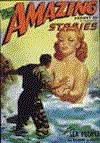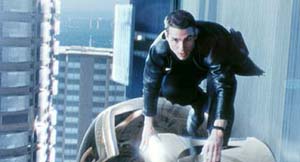|
|
|
'Minority Report' is thoughtful science fiction June 27, 2002 By Franklin Harris "Minority Report" is about what the world would be like if some people could see the future. And given the timing of its release, you might wonder if the movie's director or star can see the future, too. It's fitting that a movie about cops who prevent crimes before they happen should arrive in theaters even as the Bush Administration announces a controversial plan to strike at alleged terrorists and terror-sponsoring governments before they strike at us.
The Washington, D.C., Precrime unit in "Minority Report," however, has the assistance of the precogs, three psychically endowed young people who can predict the future. Specifically, they can see murders before they occur. Led by Director Lamar Burgess (Max von Sydow) and Detective John Anderton (Tom Cruise), the Precrime unit has eliminated murder in the former "murder capital" of the United States. No one is stupid enough to commit a premeditated murder anymore, and the Precrime unit has a quick-response team to deal with crimes of passion. Some of the cops in the Precrime unit have never seen a real murder scene. Meanwhile, those arrested for "future murders" are placed in suspended animation, their minds trapped in a kind of virtual reality, while their bodies are immobilized and unable to harm anyone. Trials aren't necessary, because there is no real evidence. There is no corpse, and, if the murder is stopped quickly enough, no weapon. There is just the say-so of the precogs, who are never wrong. Or are they? From a certain point of view, they're always wrong. After all, if a murder is stopped before it happens, then the future the precogs see never comes to pass. But after six years, the Precrime experiment seems to be an unqualified success, and, if voters approve, it's ready to go national. This, of course, is the point in any story where something goes wrong. The precogs issue a new prediction, and the murderer-to-be is Detective Anderton. So, Anderton goes on the run to determine who is framing him for the future murder of a man he doesn't know. Assuming he is being framed, of course. Starting with a short story by late science-fiction author Philip K. Dick, director Steven Spielberg has constructed a complex and sophisticated detective story. And he has set it in a plausible world about 50 years in our future. Cars drive themselves, and scanners monitor everyone's whereabouts. It's a beautiful world, beautifully realized, but dangers abound. Even the flowers aren't what they seem. As Cruise's character discovers, it isn't an easy world in which to hide. Prying eyes are everywhere. The precogs see your future. Electronic eyes see your present. And your own eyes tell everyone who you are. This is Spielberg's second attempt at serious science fiction, as opposed to the feel-good sci-fi of "Close Encounters of the Third Kind" and "E.T." But while Spielberg's previous film, "A.I.," failed because its robotic protagonist could not evolve, "Minority Report" succeeds. The best science fiction always deals with deep philosophical questions that other genres cannot grasp, and "Minority Report" is no exception. It asks, can there be such a thing as free will when we know what our future holds? Theologians have pondered questions like that for centuries, trying to square human freedom with the idea of a God who knows every move we will ever make. "Minority Reports" shows Spielberg becoming a more mature filmmaker without losing the sense of adventure that he demonstrated in his best films, all from early in his career. "Minority Report" is probably his best work since "Raiders of the Lost Ark." Cruise is as charming as ever. And Sydow lends gravity to every scene he is in. But it is Colin Farrell, playing an ambitious federal investigator, who delivers the standout performance, giving depth to a character who could easily be a mustache-twisting cliché. "Minority Report" may lack the crowd-pleasing theatrics of "Spider-Man" and the eye-popping battles of "Star Wars: Episode II," but it is by far the year's most thoughtful genre film so far. |

RECENT COLUMNS
Order a helping of Cartoon Network's 'Robot Chicken'
03/31/05
Campaign against video games is political grandstanding
03/24/05
Prize-winning author is 'Wrong About Japan'
03/17/05
Censored book not a good start
03/10/05
Some superhero comics are for 'fanboys' only
03/03/05
'Constantine' does well with its out-of-place hero
02/24/05
'80s publisher First Comics' legacy still felt
02/17/05
Director's cut gives new 'Daredevil' DVD an edge
02/10/05
Put the fun back into 'funnybooks'
02/04/05
Is 'Elektra' the end of the road for Marvel movies?
01/27/05
'House of Flying Daggers' combines martial arts and heart
01/20/05
Anniversary edition of 'Flying Guillotine' has the chops
01/13/05
Movie books still have role in the Internet era
01/06/05
Looking ahead to the good and the bad for 2005
12/30/04
The best and worst of 2004
12/23/04
'Has-been' Shatner is a 'transformed man'
12/16/04
© Copyright 2005 PULP CULTURE PRODUCTIONS
Web site designed by Franklin Harris.
Send feedback to franklin@pulpculture.net.
